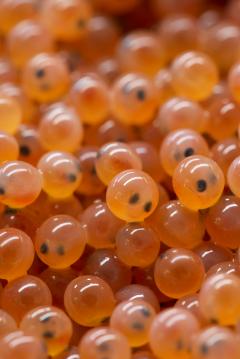Genetics expertise could transform fish production
A recent review of research highlights how genetics can support development of sustainable aquaculture for global food security.

The potential of fish and shellfish production to feed a growing global population could be significantly enhanced through advances in genetics and biotechnology, researchers have said.
Many species of fish and shellfish have been domesticated relatively recently compared with most livestock species, and so have diverse gene pools with major potential for selective breeding, according to the review paper in Nature Reviews Genetics.
The development of tools to gain insight into the genetics of these species, and apply such tools for breeding and management, provides opportunities to release that potential, researchers say.
Most aquaculture species can produce many offspring, and large populations with improved genetics can be bred quickly for improved production performance.
The benefits may include improved growth, resistance to disease or robustness in diverse farming environments.
Global demand
Farmed fish is on course to overcome wild fish as the main source of seafood, and consequently genetic tools and expertise are in high demand to increase the efficiency and sustainability of aquaculture systems, which currently rely mostly on unselected stocks.
Insight into the genomes of species can enable careful selection of a farming population with desirable traits, and monitoring genomic variation will help maintain genetic diversity as farm populations develop.
In the future, technologies such as genome editing could be used to introduce desirable traits, such as disease resistance, into farmed species, and surrogate breeding could be employed to support production of preferred species.
The review paper, in collaboration with the Universities of Stirling, Aberdeen and Exeter, is an output of the AquaLeap consortium project. AquaLeap is funded by the Biotechnology and Biological Sciences Research Council, the Natural Environment Research Council and the Scottish Aquaculture Innovation Centre, in partnership with the Centre for Environment, Fisheries and Aquaculture Science, Hendrix Genetics, Xelect, The National Lobster Hatchery, Tethys oysters, and Otter Ferry SeaFish.
There is a timely opportunity to harness the potential of farmed aquatic species, to ensure food security for a growing population. Genomic selection and biotechnology can speed up this process, and recent developments in these fields will soon be translated to benefit aquaculture production for many of these species across the world.
** The Roslin Institute receives strategic investment funding from the Biotechnology and Biological Sciences Research Council and it is part of the University of Edinburgh’s Royal (Dick) School of Veterinary Studies. **
Related links
Fish resistance to lethal virus linked to genetics
Livestock farms could benefit from genome editing
Aquaculture genetics consortium set to tackle industry challenges


